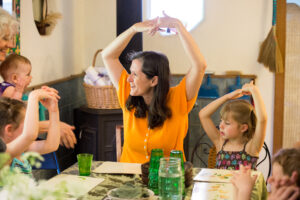Singing to your toddler can help with language development. This is because typically when language is sung, the melody requires the words be sounded more slowly than in spoken language. This gives the child the opportunity to hear more clearly the consonants, vowels, syllables and subtleties in the words and the sentence structure. In a Waldorf early childhood classroom you may hear the teacher singing instructions to the children or using transition songs to help the children move through their day. One of the first things I remember, as I became more familiar with the Waldorf system, is the injunction: Sing Your Commands! I made a beautiful sign and posted it above the classroom’s kitchen counter, to remind me of this small piece of magic. You too can weave this into your days. The simplest way is to sing about your activities with your child perhaps to the simple tune of Here We Go Round the Mulberry Bush! This is the way we brush our teeth, brush our teeth, brush our teeth. Or, This is the way we set the table…. Take a moment and search online for Waldorf Transition Songs: you will find many mothering blogs with ideas, lyrics, videos and funny stories full of whimsy and joy![i]
 Let’s now consider language in two ways: Formed Language and Free Language. I think of formed language as language that is rhymed, metered, melodic and repeated in the same way. For instance, singing songs, repeating nursery rhymes, the poetry of finger games and songs at transition times, as well as meal blessings, and bedtime prayers. You can do a quick online search for Waldorf blessings and prayers, as well. Throughout the day we can offer language that has been consciously shaped; it is formed to enchant the tongue and ear for pure pleasure. Children are delighted by this and given enough exposure, they will begin to play with language too, rhyming, alliterating as they laugh and sing.
Let’s now consider language in two ways: Formed Language and Free Language. I think of formed language as language that is rhymed, metered, melodic and repeated in the same way. For instance, singing songs, repeating nursery rhymes, the poetry of finger games and songs at transition times, as well as meal blessings, and bedtime prayers. You can do a quick online search for Waldorf blessings and prayers, as well. Throughout the day we can offer language that has been consciously shaped; it is formed to enchant the tongue and ear for pure pleasure. Children are delighted by this and given enough exposure, they will begin to play with language too, rhyming, alliterating as they laugh and sing.
This is different from what I call free language, which means the natural conversational ways we talk. During our free language though, let’s be cautious in this age of tweets and texting, that we ourselves speak slowly, clearly and in full sentences that are expressive of full thoughts! A typical way parents conduct conversations with small children is to grill them with questions, to which the child’s common reply is “I don’t know,” or a blank stare. Instead let’s try conversation that is full of images: perhaps tell of the bird you heard outside the window and ask about birds she may have heard, as well. Or try beginning a conversation about how much you liked the park when you were a child. Your memories will elicit your child’s own experiences. And away you go into meaningful dialogue.
Here are more tips for guiding language development, from Cornell University’s Department of Human Development:
- Surround the child with rich language and language exchange, beginning at birth.
- Children learn not only from language you address to them, but from language they overhear around them. Linguistic interaction has additional positive effects on linguistic development.
- Although exposure to language is essential, explicit “drilling” is not needed for the normally developing child; parents will not be ‘teaching’ the child so much as the child will discover language; they are, as one scholar put it, “spontaneous apprentices” (Miller, 1976).
- Read to children, encourage them to talk about what is read, and surround them with language through literacy.
- Share with your child the joy of words and language. [ii]
[i] Try this site, not only for transition songs, but also for ideas about a child’s dream play-space! http://blog.bellalunatoys.com/2014/waldorf-verses-songs-for-children.html
[ii] http://www.human.cornell.edu/hd/outreach-extension/upload/lust.pdf
Excerpted from With Stars in Their Eyes, Brain Science and Your Child’s Journey Toward the Self, by Sharifa Oppenheimer

Sharifa Oppenheimer is the author of the best-selling book Heaven on Earth: A Handbook for Parents of Young Children, and its companion workbook How To Create The Star of your Family Culture. She worked collaboratively to create What is a Waldorf Kindergarten, and has recently published With Stars in Their Eyes: Brain Science and Your Child’s Journey Toward the Self, all published by SteinerBooks. Her most recent book A Litany of Wild Graces: Meditations on Sacred Ecology was published in 2022.
Sharifa was the founding teacher of the Charlottesville Waldorf School where she taught kindergarten for twenty-one years. She has helped develop new teachers through mentoring and offering practicum and internship opportunities to the teacher-training students at Sunbridge College in New York, and currently offers on-line teacher trainings through LifeWays, North America. She is founder of the home-based Early Childhood program, The Rose Garden. Sharifa also travels offering lectures and workshops to school and parent groups, encouraging each one to discover their own healthy, heartfelt Family Culture. She is the mother of three grown sons, who were educated in the Waldorf tradition, and grandmother to many lively children. She lives with her husband in an enchanted forest in Virginia.
https://www.sharifaoppenheimer.org